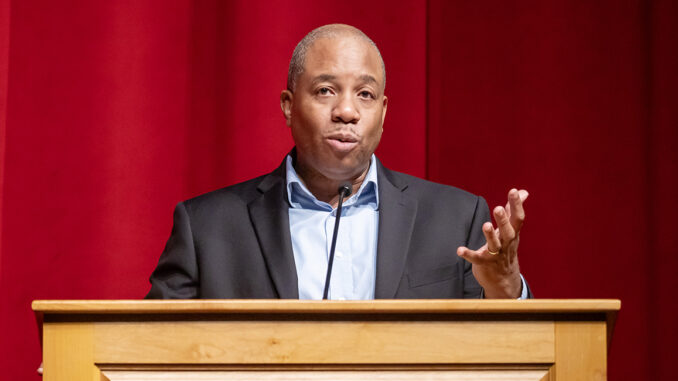
RALEIGH — Incoming State Superintendent Maurice “Mo” Green, a Democrat, will see a “smooth transition,” per a congratulatory statement issued by the outgoing Republican State Superintendent Catherine Truitt after the November election.
Green defeated Republican Michele Morrow by a slim margin, with unofficial results showing Green won by 130,653, or just over 51% of the vote. Morrow advanced to face Green after beating Truitt in a March primary surprise upset.
While the role of statewide superintendent is new to Green, he has related his experience as the first black superintendent for Guilford County Public Schools and deputy superintendent as well as general counsel for the Charlotte-Mecklenburg Schools district. Green left Guilford schools to become the director of the Z. Smith Reynolds Foundation (2016-23), an organization that his opponent highlighted as historically funding progressive causes, left-leaning nonprofits and activist groups.
Green said during a Nov. 6 Zoom press conference with the media that he plans to focus on students, particularly academic achievement and character development. He also has an eye on increasing teacher pay — something he repeatedly said while campaigning.
During the campaign, Green acknowledged the academic progress and pandemic recovery in student reading skills through the Science of Reading, a program instituted and led by Truitt through legislation. That legislation uses Language Essentials for Teachers of Reading and Spelling for reading instruction, which is further leveraged through diagnostic testing. Whether or not he follows through on Truitt’s desire to institute the same kind of transformation in math remains to be seen.
Green also told reporters he knows half of the state’s voters didn’t pick him, but he aims to listen to them.
“For those who didn’t choose me, I want to be abundantly clear that I hear the concerns. I do. I’m a listener,” Green told reporters on the Zoom call. “We’ll invite people to engage in a conversation that allows us to figure out how, perhaps with the way that I approach the work, to be heard and to help us improve public education.”
While Truitt supported school choice options, including homeschooling and private schools, Green told reporters he would work to advance school choice inside the state’s public school system. That statement aligns with his criticism of the state’s school choice options: public charter schools and the Opportunity Scholarship program (OSP), which provides grants to students to attend the private school of their choice. On several occasions, Green said he wanted to see the cap on the number of charter schools restored and the OSP to be defunded.
No time was wasted in making changes for Green’s arrival, with a new organizational structure already announced at the N.C. Department of Public Instruction (NCDPI), per a press release issued by Janet Blount, the director of human resources at the agency.
“This structure is designed to streamline our operations and ensure the alignment of long-term goals,” Blount said. She also said the new organizational structure is “designed to drive growth, efficiency and collaboration across the organization.”
The release also included a link to related NCDPI job postings, many of which offer six-figure salaries for roles like “chief academic officer” and “chief operations officer. ” These positions have annual salaries between $119,240 and $268,290.
Green’s new organizational chart puts nearly all responsibilities under the role of deputy state superintendent, a role he announced at the end of November that will be filled by Maria Pitre-Martin, who is currently the executive director of the SERVE Center at the University of North Carolina Greensboro.
“I am extremely pleased that Dr. Pitre-Martin will be joining my leadership team as my first appointment,” Green said in a press release. “The public school children of North Carolina will be fortunate to have her working on their behalf, as she brings to NC DPI extensive, successful leadership experience and expertise in education in North Carolina and nationwide.”
The deputy superintendent role is not new, especially for Pitre-Martin. She held that job in 2017 under Republican Superintendent Mark Johnson.
Under the Department of Public Instruction’s 2024 organizational chart, Truitt had three deputies, and each headed up a different division: Jeremy Gibbs, Michael Maher, and Andrew Smith. When Truitt was elected in 2020, she had announced Catherine Edmonds as her deputy superintendent for the Office of Equity and Robert Taylor as the deputy superintendent of student and school advancement. Taylor is now the superintendent of Wake County Public Schools.
On the topic of school safety, Green has indicated he favors more mental health professionals in schools instead of more school resource officers. Truitt has worked closely with the Center For Safer Schools (CFFS), which has led school resource officer training, discipline initiatives and emergency preparedness guidance for the state’s K-12 schools.
During Truitt’s tenure, CFFS was housed under NCDPI until the override of the governor’s veto of Senate Bill 382 this past December. Under that legislation, CFFS will return to the N.C. Department of Public Safety.
Green has not yet commented on CFFS’s move nor given any detailed plans for school safety.



